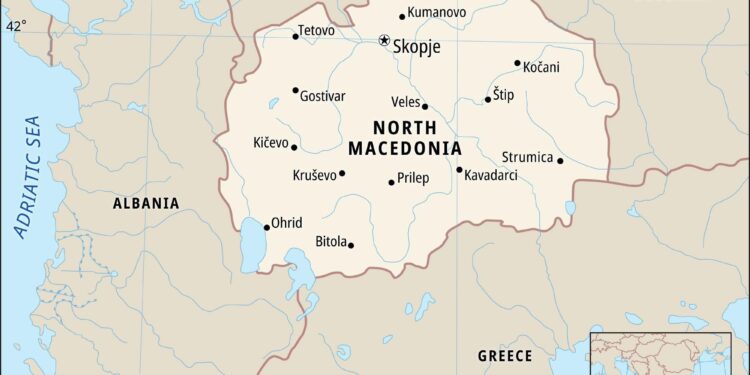North Macedonia is accelerating its push to modernize the agricultural sector through enhanced digitalization, aiming to boost productivity and sustainability across the industry. In collaboration with the Food and Agriculture Organization (FAO), the country is implementing innovative technologies and data-driven solutions to support farmers, improve resource management, and strengthen food security. This strategic move reflects North Macedonia’s commitment to embracing digital transformation as a key driver for agricultural development and rural prosperity.
North Macedonia Expands Digital Tools to Modernize Farming Practices
North Macedonia is embracing cutting-edge technology to revolutionize its agricultural sector. Through strategic partnerships and support from the Food and Agriculture Organization (FAO), the country is deploying an array of digital tools aimed at enhancing productivity, sustainability, and resource management. Farmers now have access to real-time data on weather patterns, soil conditions, and crop health – transforming traditional farming into a data-driven enterprise. These innovative solutions empower agribusinesses to make informed decisions, reduce waste, and maximize yields amid climate challenges.
Key elements in this digital transformation include:
- Mobile apps for pest monitoring and early warning systems
- GPS-based soil analysis to optimize fertilizer application
- Cloud platforms enabling remote farm management and market access
The Ministry of Agriculture reports that pilot projects have already led to a 20% increase in farm efficiency and a significant drop in input costs. Below is a snapshot of current digital adoption rates among farmers in various regions:
| Region | Farmers Using Digital Tools | Yield Improvement |
|---|---|---|
| Skopje | 65% | 18% |
| Bitola | 55% | 22% |
| Ohrid | 48% | 19% |
Enhancing Data-Driven Agriculture Through FAO Collaboration
North Macedonia has intensified its partnership with the Food and Agriculture Organization (FAO) to revolutionize its agricultural sector through data-driven technologies. This collaboration leverages advanced digital tools, including Geographic Information Systems (GIS), remote sensing, and mobile data platforms, to enhance crop monitoring, pest management, and yield forecasting. By integrating these innovations, local farmers gain access to real-time, actionable insights that enable informed decision-making, optimize resource use, and increase productivity across varied terrains and climates.
Key components of this initiative include:
- Development of a national digital farm registry that accurately maps land use and crop distribution.
- Training programs for smallholder farmers on utilizing mobile applications for market updates and weather alerts.
- Implementation of data-sharing platforms fostering transparency and collaboration between public agencies and private stakeholders.
A recent analysis by FAO indicates the tangible benefits of digital agriculture in North Macedonia with promising improvements recorded in yield efficiency and sustainable resource management, as summarized below:
| Indicator | Before Digitalization | After Digitalization (12 months) |
|---|---|---|
| Average Crop Yield (tons/ha) | 3.2 | 4.5 |
| Water Usage Efficiency | 65% | 82% |
| Pest Infestation Rate | 18% | 9% |
Policy Recommendations to Boost Digital Adoption and Sustainable Growth
To accelerate the integration of digital technologies in North Macedonia’s agricultural sector, targeted policies must prioritize both infrastructure development and farmer empowerment. Investing in affordable broadband connectivity across rural areas is crucial to ensure that farmers can access real-time data, market trends, and technical advice. Additionally, subsidies for digital tools and training programs tailored to small and medium-sized farms will help bridge the existing knowledge gap, enabling producers to harness precision agriculture, smart irrigation, and crop monitoring technologies effectively.
Complementing infrastructure and capacity-building efforts, the government should establish a supportive regulatory framework that encourages innovation and private sector participation. This includes:
- Tax incentives for agri-tech startups and digital service providers
- Data-sharing platforms for transparent market information
- Partnerships with international organizations to scale best practices
| Policy Focus | Key Action | Expected Outcome |
|---|---|---|
| Digital Infrastructure | Expand rural internet coverage | Enhanced access to digital tools |
| Farmer Training | Implement hands-on workshops | Improved tech adoption rates |
| Regulatory Support | Offer tax relief to agri-tech firms | Stimulate market innovation |
In Summary
As North Macedonia intensifies its push toward digitalizing agriculture, the country positions itself at the forefront of technological innovation in the region’s farming sector. Supported by the Food and Agriculture Organization, these initiatives aim to boost productivity, improve resource management, and enhance food security for its population. While challenges remain, the ongoing efforts signal a significant step toward modernizing agriculture and fostering sustainable development in North Macedonia.
















